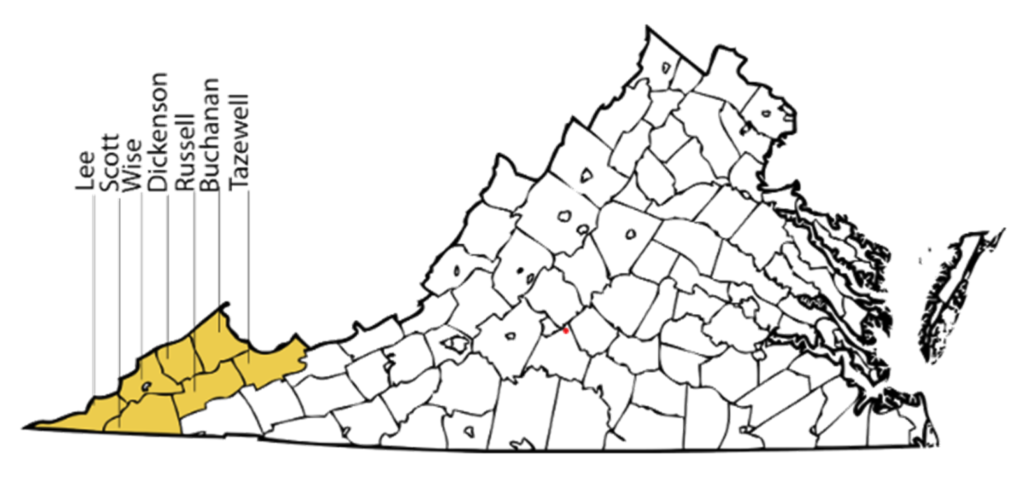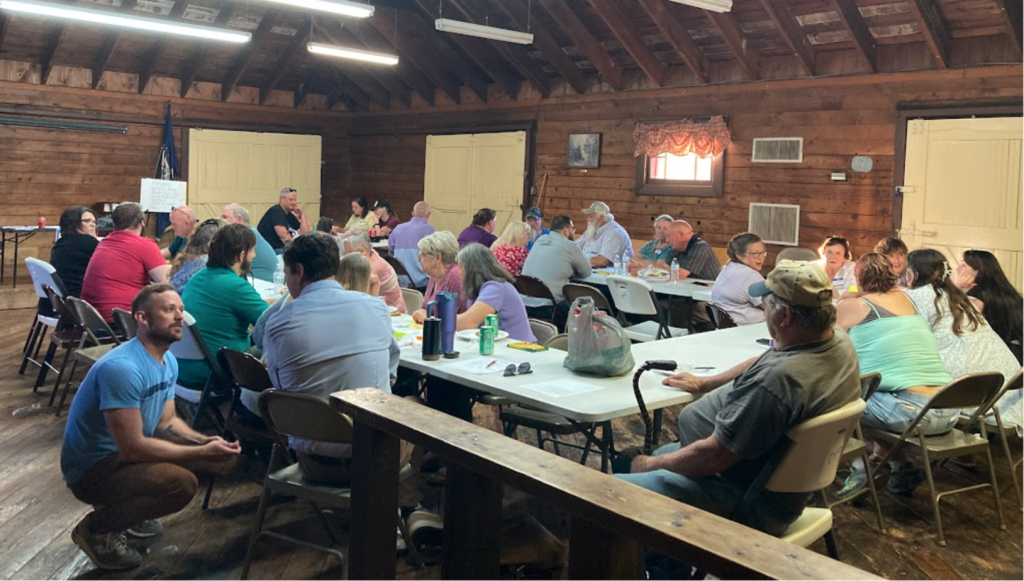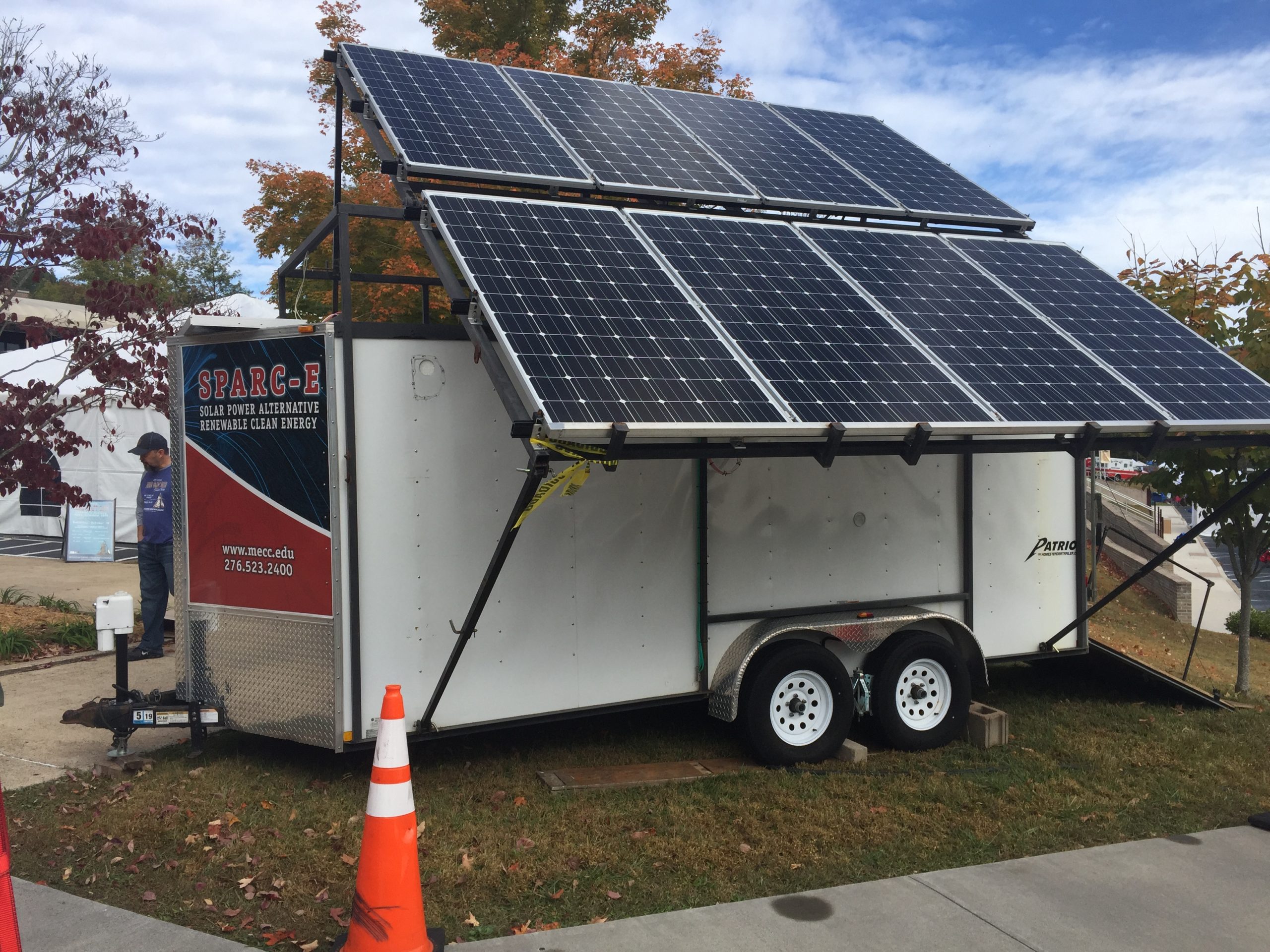Front Porch Blog
No one can deny that being resilient is a pride point for Southwest Virginians. The ability to make do and maintain self-reliance during difficult times seems branded into the hearts of many coal communities across Appalachia.
However, there is one thing communities are often reliant on, no matter where you are: access to affordable and reliable electricity. Whether it’s a medical device, like a CPAP machine, or heating and cooling during extreme temperatures, electricity is an important part of a community’s overall resilience. This is especially true during local disasters and power outages.

The seven counties shown above make up the historically coal-producing counties covered by the Solar Workgroup of Southwest Virginia. Map by Solar Workgroup of Southwest Virginia
Southwest Virginia has a series of unique risks when it comes to power outages. As an almost entirely rural region, Southwest Virginia has historically seen less investment in our communities and infrastructure, including energy systems to serve locals. The U.S. Department of Energy states in its Energy Improvements in Rural and Remote Areas program, “Due to low population density and isolation from larger electric systems, (rural) communities face higher energy costs and poor electrical reliability.”
Rural communities are also more likely to see more frequent or longer power outages and aging powerlines. Aging populations, such as those calling Appalachia’s rural communities home, often see an increased need for energy security for general health and safety needs. Mining communities experience a greater prevalence of individuals with respiratory diseases, such as black lung and asthma, resulting from coal mining and other fuel industry practices, who may rely on electricity for medical equipment.
The region is also home to a high percentage of low-income families, who have less expendable resources to spend on backup generators. Plus, fuel-based generators can present their own risks such as localized air pollution, expensive fuel dependence and carbon monoxide poisoning.
Whether it is outages due to storm conditions and snow storms like 2010’s Snowmageddon, or flooding events that leave people without safe residence, natural disasters present a significant risk in rural and mountainous regions. This is why Appalachian Voices and the Solar Workgroup of Southwest Virginia are excited to begin working with communities on increasing energy resilience throughout the coal-mining region.

Appalachian Voices hosted the Dungannon Community Resiliency Meeting at the town community center in April 2024, which included discussions about solar plus storage opportunities. Photo by Emma Kelly
There are many ways to help create resilient communities. Our approach has started with in-depth community engagement around providing communities with clean, reliable and affordable energy no matter the scenario. This includes clean energy paired with batteries, electricity use reduction, regular energy bill savings and identifying the unique needs of communities. To usher in new opportunities for energy resilience, multiple new programs have been brought to Southwest Virginia.
Before purchasing energy generation and storage equipment (batteries), building owners should consider opportunities to reduce their everyday electricity use and energy bills. This will make power generation cheaper and stored energy last longer when you need it most.
The U.S. Department of Energy’s Buildings Upgrade Prize has awarded funds to Appalachian Voices for the development of an energy-saving commercial buildings pilot program in Southwest Virginia called the Renewables Advancing Community Electrification and Resilience program. Through this program, we will help building owners access the technical and financial assistance needed to install new heat pumps and energy efficiency upgrades at community anchor buildings — which include nonprofits, public institutions, health centers, community centers and local businesses. The program will allow building owners to significantly reduce their annual energy bills and consider additional savings opportunities such as solar panels.
Participating communities will also be able to access the technical assistance and monetary resources needed to consider solar energy plus battery storage for energy resilience hubs. This will allow communities to identify and create local hubs that provide reliable access to electricity and address community needs during power outages or other major disruption events such as floods.

Mountain Empire Community College’s Solar Power Alternative Renewable Clean Energy solar and battery-powered trailer displays the potential for deployable energy resilience equipment by powering the 2021 Home Craft Days Festival. Photo by Austin Counts
Appalachian Voices and the Solar Workgroup of Southwest Virginia are working with the Virginia Department of Energy, Resilient Virginia and the Center for the Advancement of Sustainable Energy at James Madison University to aid in planning and community engagement around energy resilience resources for Southwest Virginia’s coalfields through the Virginia Energy Resilience program.
In April, Virginia Energy announced that it received $1 million in federal funding for this new program. “The end goal is to ensure communities have a plan toward improving community energy resilience during major weather events,” the agency wrote in a press release.
Energy resilience resources include energy hubs, which are facilities where community members can have reliable electricity during a power outage. Another innovative technology communities may consider for energy resilience is mobile energy generation and storage equipment such as Mountain Empire Community College’s SPARC-E trailer, which has powered community events with clean energy.
But we can’t stop there. Once we have the plans for these energy-resilient facilities, we hope to help communities secure the funding needed for construction. The Appalachian Solar Finance Fund is one source of financial support that would be open to Southwest Virginia facilities. Local government buildings can also consider the Virginia Department of Energy’s Energy Savings Performance Contracting program or the Virginia Department of Emergency Management’s Emergency Shelter Upgrade Assistance Grant Fund, when additional rounds of funding become available.
Southwest Virginia’s representation in broader stakeholder groups is a key part of telling Appalachia’s energy story and ensuring that the region is included in solutions to the nationwide resilience effort. Appalachian Voices’ role in the Resilient Virginia Collaborative Alliance will help regional efforts work with similar communities across the state. RVCA is a collaborative of Central and Southwest Virginia organizations focused on building regional capacity to address equity, economic, social and climate challenges, and create resilient communities. This will inform future work by the organization and the Solar Workgroup of Southwest Virginia while we collaboratively work towards a more resilient energy future.
Much of this work would not be possible without federal awards for community capacity building such as DOE’s Energizing Rural Communities Prize. Funds from this prize ensure the Solar Workgroup and Appalachian Voices are advancing and expanding the region’s capacity to participate in the nation’s clean energy landscape and increase the resilience of communities facing the impacts of a changing climate. This includes working directly with Solar Workgroup members, facilitating member meetings, and working directly with communities to address barriers to clean energy development and energy resilience.
If your community or organization needs assistance with clean energy, energy efficiency or energy resilience planning, reach out to austin@appvoices.org.
PREVIOUS
NEXT
Related News

Leave a comment
Your email address will not be published. Required fields are marked *
